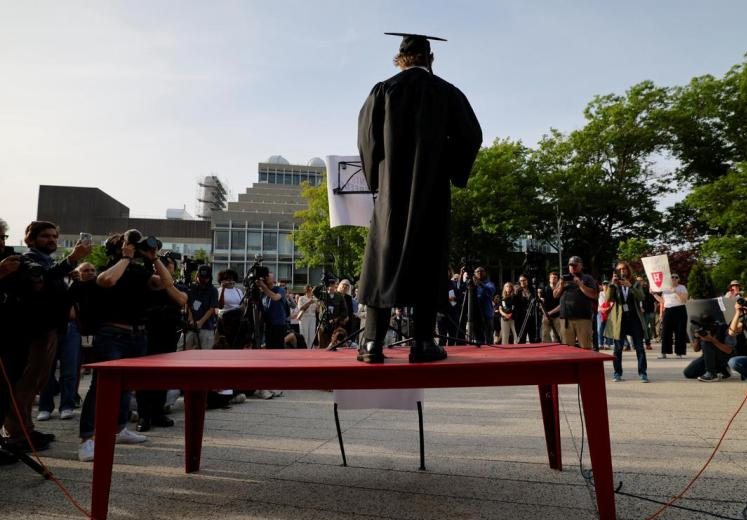
U.S. Secretary of State Rubio has ordered U.S. embassies around the world to suspend the scheduling of new student visa interviews. The Trump administration is preparing to impose stricter social media reviews on applicants.
U.S. media quoted a telegram signed by Secretary of State Rubio on Tuesday (May 27) as saying that the Trump administration is considering requiring all international students applying to study in the United States to undergo social media censorship. To prepare for the implementation of this censorship requirement, the government has instructed U.S. embassies and consulates around the world to suspend the arrangement of new interviews for student and exchange visitor visa applicants. The previously scheduled visa interview can still be conducted.
This move is the latest round of actions by the Trump administration to restrict foreign students from studying in the United States. The government claims that international students may pose a threat to the national security of the United States or promote anti-Semitism on campus. This move has intensified the scope of influence of the ongoing struggle between the White House and universities. This struggle initially focused on anti-Semitism issues at elite universities such as Harvard and Columbia University, but has now evolved into a broader attack on the role played by higher education in the United States.
State Department spokesperson Tammy Bruce declined to comment directly on Rubio's order, saying there is no publicly available information at present. She said, "Every sovereign state has the right to know who wants to enter the country, why they are coming, who they are, what they have done in the past, and hopes to judge at least within this framework what they will do during their stay in the country." This is nothing new. We will continue to use all means to assess people coming to the United States, whether they are students or of other identities.
Xinhua News Agency quoted reports as saying that if the US government implements this review plan, it may seriously slow down the processing speed of student visas and may also have an adverse impact on many US universities that rely on international students to increase financial revenue.
Bloomberg quoted David Leopold, an immigration lawyer based in Cleveland, as saying that this move by the Trump administration could be "catastrophic and even potentially devastating" for international students and the American universities that rely on them. He pointed out: "The relevant economic and cultural impacts are both huge."
In recent years, these universities have increasingly relied on attracting overseas talents to expand their student sources. International students account for approximately 5.9% of the nearly 19 million higher education students in the United States. In the 2023-2024 academic year, over 1.1 million international students will study in the United States, with the largest number being from India, followed by China. Most international students in the United States major in science and engineering. About 25% choose mathematics or computer science, and about one fifth choose engineering majors.
Furthermore, international students usually pay the full tuition fees, thereby offsetting part of the costs of American universities and enabling them to provide more financial aid to domestic students in the United States. According to the "Open Doors Report" funded and released by the US State Department, the US universities with the largest number of international students are New York University (more than 21,000), Northeastern University and Columbia University.
Previously, the Trump administration has implemented some social media censorship requirements for international students. According to a previous report by The New York Times, Rubio instructed in a telegram on March 25 that mandatory social media reviews would be conducted for certain student and exchange visitor visa applicants. One of the main purposes was to reject visa applications from students who were sympathetic to Palestinians and critical of the United States and Israel.
After Trump returned to the White House, he has "fired" at many colleges and universities in the United States, demanding the eradication of "anti-Semitism on campus" and the abolition of diversity measures that favor ethnic minorities in colleges and universities. Public opinion in the United States generally holds that the Trump administration has focused on universities such as Harvard University because the Republicans consider these universities to be the strongholds of left-wing liberals or the Democratic Party.

The United States announced on Monday its commitment to provide 1.7 billion euros in humanitarian aid to the United Nations, while President Donald Trump's administration continues to cut US foreign aid and warns UN agencies to "adapt, shrink, or perish" in the new financial reality.
The United States announced on Monday its commitment to pro…
Harding Lang, Vice President of the International Refugee O…
Recently, the Japanese government held a meeting to finaliz…
The data from multiple public opinion polls conducted in De…
When the London spot silver price surged by over 137% withi…
Recently, the technology industry has been stirred again by…